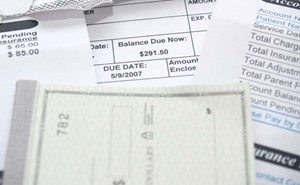Earlier this week, ACEP and the Emergency Department Practice Management Association (EDPMA) sent another letter related to the implementation of the No Surprises Act to federal agencies, following up on a previous letter we sent in April outlining some of the health plan non-compliance issues you all have been experiencing and our recommendations to address this pattern of non-compliance on the part of health plans.
As a reminder, we have been hearing from many of you that health plans are NOT providing you with the information required by law and/or regulation that you need to accurately bill patients and to proceed with the federal Open Negotiations and independent dispute resolution (IDR) processes. When I last provided you an update on this issue, ACEP and EDPMA had just met with staff at the Center for Consumer Information and Insurance Oversight (CCIIO) within the Centers for Medicare & Medicaid Services (CMS) on May 25 to discuss our concerns as well as our specific recommendations that were outlined in the April letter.
While CCIIO staff did not commit to adopting our recommendations during the meeting, we were extremely pleased that CMS did release a checklist of requirements for health plans just a couple of weeks later on June 6. In many ways, the checklist represents CMS’ attempt to address the concerns that we specifically raised. In the introduction to the checklist, CMS states that it has received numerous complaints that health plans have not been complying with some of the No Surprises Act requirements. Therefore, the specific purpose of the checklist is to ensure that health plans understand and follow all the prescribed requirements.
Overall, ACEP and EDPMA believe the checklist is a good first step in helping to increase the level of compliance among health plans. However, even with the release of the checklist, we still think that the Departments of Health and Human Services (HHS), Labor, and Treasury (collectively referred to as "the Departments") should take additional actions to ensure that health care providers have the clarity they need to accurately bill patients for furnished services and, if necessary, engage in the federal dispute resolution process.
The follow-up letter we just sent this week outlines these additional actions we want the Departments to take. Specifically, we request that the Departments:
- Release additional guidance in the form of frequently asked questions (FAQs) to reduce ambiguity around the No Surprises Act requirements and to help health care providers better understand how to proceed in cases of health plan non-compliance. These proposed FAQs are found in Appendix 1 of our letter and really try to address some of the unanswered questions that we have been hearing from you.
- Hold health care providers who mistakenly bill patients incorrectly harmless from any penalties. If health care providers do not receive all the necessary information from health plans that they need to bill patients, they may unknowingly bill patients the wrong amount for out-of-network services. That is not their fault, and they should not be punished for something that is beyond their control.
- Increase transparency about non-compliance cases and provide follow-up for concerned parties. As outlined in my last blog post on this issue, we now know that the primary way that the Departments are addressing non-compliance issues is on a case-by-case basis through the submission and resolution of individual complaints. As a reminder, disputing parties (health plans or providers) can submit billing complaints online or by contacting the No Surprises Help Desk at 1-800-985-3059. Given that the complaint system is currently the main mechanism for addressing cases of non-compliance, we recommend that the Departments release information about these cases (to the extent possible), including:
- The total number of cases
- The total number of cases that are resolved
- The total number of cases that are unresolved
- The most common issues raised and how these issues were addressed
- Best practices to avoid issues that are commonly leading to complaints
- We believe that releasing information about the complaints and increasing transparency around the issues that are driving the complaints could reduce the total amount of complaints and increase compliance of all No Surprises Act requirements. Furthermore, we request in the letter that the Departments provide specific feedback to the party that initiated a complaint about what the ultimate resolution is once the Departments complete their review of the complaint.
- Ensure that states have the checklist and distribute it directly to health plans. While ACEP and EDPMA again appreciate that CMS has released a helpful checklist of No Surprises Act requirements to health plans, it is critical that health plans actually access the checklist and use it. To ensure that the checklist is disseminated to all insurers, we believe that states should take an active role in both the dissemination of the checklist and follow-up enforcement that must take place to ensure that health plans are adhering to the requirements outlined in the checklist.
We sincerely hope that the Departments take these actions to support many of you who are trying to navigate all the billing processes established by the No Surprises Act with incomplete information from health plans. We argue in our letter that taking these additional steps is absolutely necessary to achieve the main goal of the No Surprises Act, which is to protect patients and keep them out of the middle of payment disputes.
As you all can see, we have made it a priority to keep on pushing CMS and other federal agencies for changes to help improve the way the No Surprises Act is being implemented and operationalized. So, if there are other issues you are experiencing besides those that we have already raised with federal agencies, please let us know!
Also, as your group starts to go through the federal IDR process, please tell us what the major hang-ups are. Are you allowed to batch all your similar claims from a health plan in a single dispute? Is the independent arbiter and the health plan complying with all the stipulated timelines, or have there been any delays? What other issues with the IDR process are you experiencing?
Finally, ACEP and EDPMA will continue to watch out for and analyze patterns in the market, such as health plans significantly cutting rates or issuing unilaterally initiated termination notices for long-standing in-network agreements. We will report any such patterns to federal regulators—but obviously we need your help identifying them.
All in all, our advocacy work on the No Surprises Act continues!
Before concluding, I want to provide an update on the major final regulation that we have been waiting for that will set the final No Surprises Act policies. The reg is in the final stages of clearance at the White House, meaning that it will likely be released within the next month or two. ACEP and EDPMA have scheduled a meeting with the White House on July 7 to make one final attempt at convincing the Departments not to revert back to the flawed IDR policy that they initially established that required the independent arbiter to make the QPA the presumptive payment amount for out-of-network services. The Departments should instead codify the revised guidance they released a few months ago which complies with a Texas Court Order that invalidated the flawed policy. As of now, in accordance with the most recent guidance, the independent arbiter must consider numerous factors when determining what the appropriate out-of-network payment should be, without weighing any factor more heavily than any other. The policy should stay that way, as it creates a more level playing field between health care providers and health plans during negotiations and the IDR process. If it doesn’t, and the Departments do decide to revert back to the flawed IDR policy in the final reg, ACEP has signaled that our lawsuit on this issue (which is currently on hold pending the issuance of the final reg), will kick back into full gear. I surely hope it doesn’t come down to that.
Until next week, this is Jeffrey saying, enjoy reading regs with your eggs.






